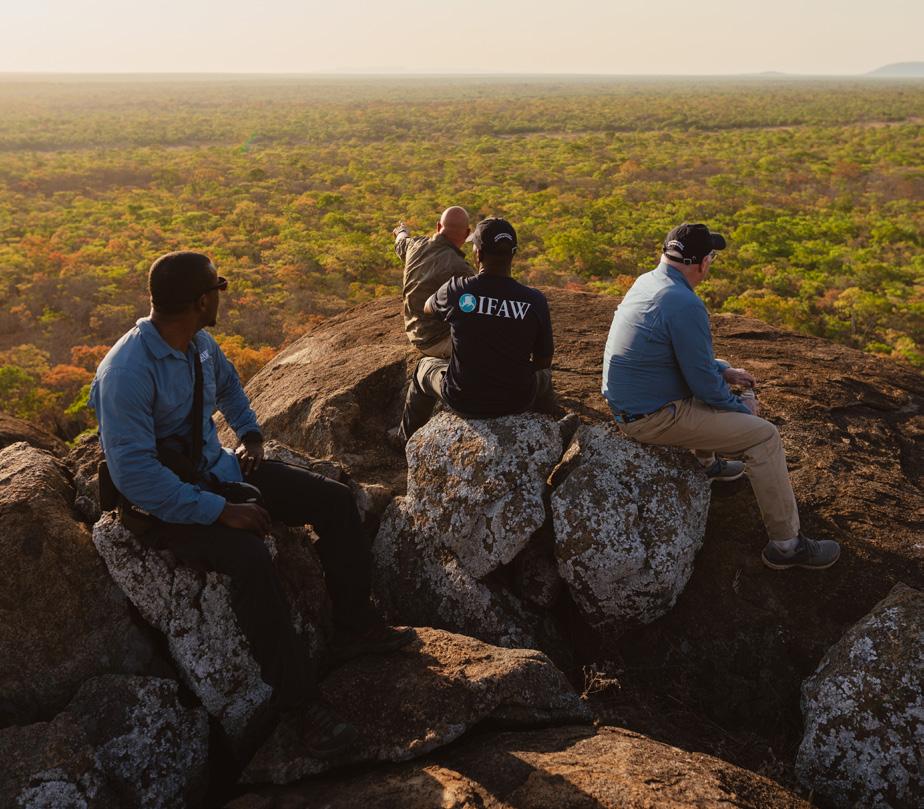
3 minute read
22nd Report: The critical role of law enforcement at
22ND REPORT
The critical role of law enforcement at preventing future pandemics — Photo credit: ©IFAW. Lesanne Dunlop
Many of you will already be aware from previous articles, that Leonard Joel and IFAW (International Fund for Animal Welfare) formed an unlikely friendship, which has already driven critical momentum for change within the environmental sector. The following is taken from part of the testimony provided by Dr. Jimmiel Mandima, Deputy Director of Conservation at IFAW, during a virtual hearing of the International Conservation Caucus Foundation (ICCF) held in April, 2020, entitled “Wildlife Trade, Origins of COVID-19, and Preventing Future Pandemics”. The full blog can be read at IFAW’s website, ifaw.org.
As we continue to face the crisis caused by COVID-19, it is incumbent upon us to address the causes of this novel coronavirus and examine ways that we can work together to protect against future zoonotic pandemics. Law enforcement plays an absolutely critical role in protecting against future pandemics. COVID-19 and other major illnesses that have spilled over from wildlife populations, have been triggered by imbalances in ecosystem health which are largely driven by human development and consumption habits, and ultimately resulting in increasing levels of wildlife trade. To be clear, while COVID-19 originated in wildlife, it spread into the human population because of human activities. These activities need to be addressed holistically through cross-sectoral integrated planning and coordinated solutions that use the One Health approach, which recognises the connection between the health of people, animals and the environment, in order to avoid future pandemics.
There is incredible will in communities on the ground to continue to conserve wildlife and habitats even in the face of overwhelming stressors. This fact is not often given the credit it deserves. Rangers are under tremendous stress, many of whom are working far away from their families for months at a time. In the absence of tourism however, IFAW is seeing collaboration across public and private sectors, with reports that some wildlife parks are increasing ranger deployment to prevent more wildlife crime. However, with as much as 99% of tourism revenue lost for the foreseeable future, conservation successes will also be lost—unless we can provide short term stimulus or emergency funding that allows communities to survive without reverting to illegal or counterproductive activities.
Data is still being gathered on the effects of COVID-19 in conservation areas, but we know that the closure of tourism means fewer people are around to scare off poachers, which leads to a rise in poaching activities. For example, where tourism has been heavily impacted by COVID-19, increased incidents of cyanide poisonings have killed five elephants in parts of Hwange National Park and a Community Wildlife Estate close to Victoria Falls UNESCO World Heritage Site in Zimbabwe. This was likely originally driven by job loss and economic stressors. The use of cyanide is sadly no new phenomenon, but often results in secondary poisoning of other predators including lions, as cyanide is unselective. And, such poisoning raises obvious concerns for the community at large.
It is abundantly clear that wildlife and other natural resources are intertwined with livelihoods in communities across the globe. Natural resources are key engines for a healthy society and economic development, while building resilient communities, where the rural

Jimmiel Mandima. ©IFAW ©IFAW

economy is diverse enough to provide the right balance for sustainability is key to protecting wild animals and habitats. Desperate local communities that truly value wildlife as a source of pride and identify with it for culture, tradition, religion and other sustainable livelihoods needs, end up extracting resources wantonly. Meanwhile criminal syndicates entice them and get them to be complicity to poaching.
It is within this context that the importance of safeguarding wildlife and other natural resources is so critical, making law enforcement so vital at all levels. Supporting the men and women in protected areas is fundamental, complementing ranger training and support with technologies that facilitate identifying and prosecuting wildlife poaching and trafficking, and other illegal activities that degrade the environment.
Enforcement is an immensely critical element, however, it cannot exist in a vacuum. We must also take steps to address the root causes of wildlife crime, including poverty and food insecurity and demand for illegal products. And we must look beyond the illegal trade in wildlife if we truly want to protect against zoonotic pandemics: habitat destruction and biodiversity loss, two key drivers of zoonotic spillover. This is a pivotal moment in human history – our world has been shut down by the exploitation of wildlife. Our response must be holistic, transformational, and comprehensive.
JIMMIEL MANDIMA, Deputy Vice President of Conservation at IFAW










